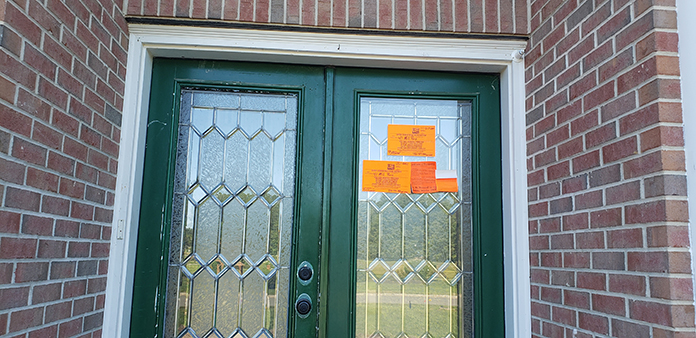
JACKSON – Township attorneys put significant blame of a costly legal settlement on comments made by the public during prior council and planning board meetings.
During a lengthy March 8 council session, details of that settlement were presented. Many who spoke during the public comment period didn’t like what they heard.
The Township Council voted to approve a resolution that settled the two-year-old lawsuit which alleged improprieties in the Planning Board’s denial of the Jackson Trails residential development application.
The lawsuit claimed there was bias against the growing Orthodox Jewish population in Jackson. This community has grown substantially in recent years, with an estimated 2,500 families currently living in the township. This increase is more than double than the 1,200 cited in Jackson Trails’ 2020 lawsuit.
The agreement allows for the development of Jackson Trails to proceed. The settlement also comes with a $700,000 price tag for the township’s insurance. The plaintiffs were Jackson Trails, LLC, Jackson 222324, LLC, Jackson Farms, LLC, Jackson Run, LLC, Jackson Walk, LLC, and Lakewood Investments, LLC that were represented by attorney Sieglinde K. Rath. Attorney Donna Jennings represented developer Mordechai Eichorn – principal of Jackson Trails.
Rath was contacted by The Jackson Times but at press time did not respond.
The developer of Jackson Trails sought approval from the Planning Board in 2019 to construct 459 housing units and a house of worship on a 130-acre property close to the township’s border with Manchester. After testimony was heard along with a public hearing, the application was denied by the Board. Parts of the development were relocated on the property away from an environmentally contaminated adjacent property, which the Planning Board said was part of the reason for its 2019 denial.
On February 3, 2020, Jackson Trails LLC, filed litigation naming the town and the Planning Board as defendants. Developers asserted the board denied their application “bowing to severe anti-Semitic pressure from local residents and fears that Orthodox Jews may purchase homes and reside in the development, and due to the inclusion in the development of a house of worship that may be used as a synagogue for Orthodox Jews.”
The 97-page complaint also asserted the board’s decision was “part of a rising tide of anti-Semitism in the township.” The complaint specifically used questions and comments made by residents during public hearings and posted on social media as evidence of antisemitic hostility.
Township Attorney Gregory McGuckin explained the settlement saying, “had it just been a land use case, had it just been a denial of an application, would have been resolved some time ago and it would have been resolved in a much more favorable manner to Jackson.”
McGuckin added, “unfortunately, because of comments that were made during that (Planning Board) hearing and comments that were made from the public, it provided the developer the opportunity to use those comments to take a simple land use case and turn it into a religious discrimination matter which then went to federal court.”
The attorney further explained that instead of filing the case in Superior Court as is the practice for most land use disputes, such comments allowed Jackson Trails to sue the township in federal court under the Religious Land Use and Institutionalized Persons Act, (RLUIPA) which prohibits municipalities from placing overly burdensome land regulations on religious groups.

The move from a state court to a federal court changed the laws that applied in the case, the remedies that were available for settlement and the damages that could be sought by the plaintiffs.
“Those kinds of comments do not help the township. It only ends up hurting the township because the comments that are made from members of the public, who have the right to feel however they want, when they make those comments at a public hearing the entire town is painted with that brush,” McGuckin added.
McGuckin said that when a judge “hears those comments, it is assumed those comments reflect the will of the people of the township. He also noted that such comments have “placed the township in very difficult positions in this case and others; one of which we have been able to resolve at a high cost and a difficult process.”
The complaint also cited an e-mail by Planning Board member Jeffrey Riker to other Planning Board members, alleging that construction already had begun on the property before the proper approvals were secured, as a potential conflict of interest. Riker recused himself from voting on the project, at McGuckin’s suggestion. McGuckin represented the Planning Board at that time.
Attorney Brent Pohlman who represented the township in this case further explained. “The reason this litigation arose and the reason it dragged on for as long as it did, and the reason we are settling in the cost we are, are threefold. The first is there are statutes available to property owners and the plaintiffs that enable them to weaponize decisions made by governing bodies regardless of the intent.”
Pohlman explained the federal statute puts the burden and places significant obligations on public entities that have been alleged to have violated the law. It also compels the defendants to prove their actions were based on appropriate criteria and legal principles.
“Additionally in this litigation, we were faced with (affordable housing) claims. While (affordable housing) has a noble intent, it is often weaponized and used by developers who believe they were improperly denied relief,” Pohlman added.
Every town in New Jersey is required by state law to set aside a certain percentage of housing as “affordable.” The theory is that it prevents towns from keeping poor people out. Critics have said that this law takes away home rule. They also say that these so-called affordable homes are still out of the price range for the poor.
Pohlman said the third reason behind the litigation were the public comments made during Planning Board meetings where the application was being considered.
He stressed such comments “contaminated our record. Comments that were not made by any elected or appointed official, but nonetheless, pursuant to our federal courts’ decisions, when there are comments that are made before a public body on the record at a quasi-judicial proceeding, those comments are considered to have the opportunity to have influenced those appointed or elected officials who made the decisions.”
Pohlman added, “while members of our Planning Board and members of our governing body may have never said a single word, a single inappropriate word, they are forced to defend against an allegation that comments made by others contaminated their decision-making process and that creates a very difficult burden for public entities to overcome in these litigations.
“There were comments made before that board that had nothing to do with matters that the Planning Board has any authority over,” he said. “The Planning Board doesn’t have authority over schools. The Planning Board doesn’t have authority over where kids in the development go to school. The Planning Board doesn’t have authority over where kids in the development get bused.”
Pohlman did not disclose all the details of the settlement, but stated four additional affordable housing units were added during negotiations.
Resident Jennifer Cusanelli was among a dozen people who came before the microphone to comment on the issue. She questioned council members about use of a home that was issued multiple red stop-work orders with stickers affixed to the front door, and whether it could legally be used as a place of worship as it was “basically deemed uninhabitable because there have been structural walls taken down.”
Township Attorney Gregory McGuckin clarified that people were permitted to worship in the home and that the stop work orders were construction violation notices.
To her question of whether there was a maximum capacity for such a use, Cusanelli was informed that only a fire code violation would be issued.
She added that the township and residents were aware of the situation and asked the Council if they knew just how many houses of worship there were operating within Jackson. “Forty-one and I don’t even live on that side of town,”
Cusanelli noted the township was “about to approve three schools that house 2,100 students, not one of which is a person of color and we are okay with this. Nothing is happening to stop what is going on.”
Sheldon Hofstein, a former zoning board chairman, responded to the settlement announcement saying it was “replacing discrimination with discrimination. Shame on you.”
He chastised the township, Mayor Michael Reina, the developer and members of the Jewish community that were in favor of the resolution. “Realize this resolution is against Jewish values. Shame on you.”
After he attended a meeting in 2019 of the community watchdog group Citizens United to Protect Our Neighborhoods, (CUPON) led by Elenor Hannum, Hofstein resigned from the Zoning Board amid controversy that he and two others on municipal boards who attended that CUPON meeting were now in a conflict of interest. CUPON criticized the settlement in a Facebook post after the meeting.
While many residents at the night’s council meeting suggested that, when built, the Jackson Trails home would be sold exclusively to members of the Orthodox Jewish community, Pohlman responded saying such fears were misguided. He explained while the municipality can’t dictate to whom any property owner can market or sell its land, all sales – including Jackson Trails – are subject to the Fair Housing Act, which prohibits housing discrimination.
Pohlman said “this settlement doesn’t insulate them from that. Given the potential risks to the township, this settlement – while certainly not ideal – was a prudent settlement in that it limits the cost and potential liability and it moves forward a project that is frankly better than what was initially proposed.”
Beyond the Jackson Trails lawsuit, the township is still facing other discrimination litigation. The pending cases involve the Department of Justice, New Jersey Attorney General’s Office and an Orthodox Jewish advocacy group – each of whom have filed discrimination lawsuits citing alleged anti-Semitic actions by the municipality, specifically ordinances that banned the construction of schools, dormitories and eruv wires. It also includes a series of alleged stake outs of Orthodox Jewish prayer services that took place within private homes.






